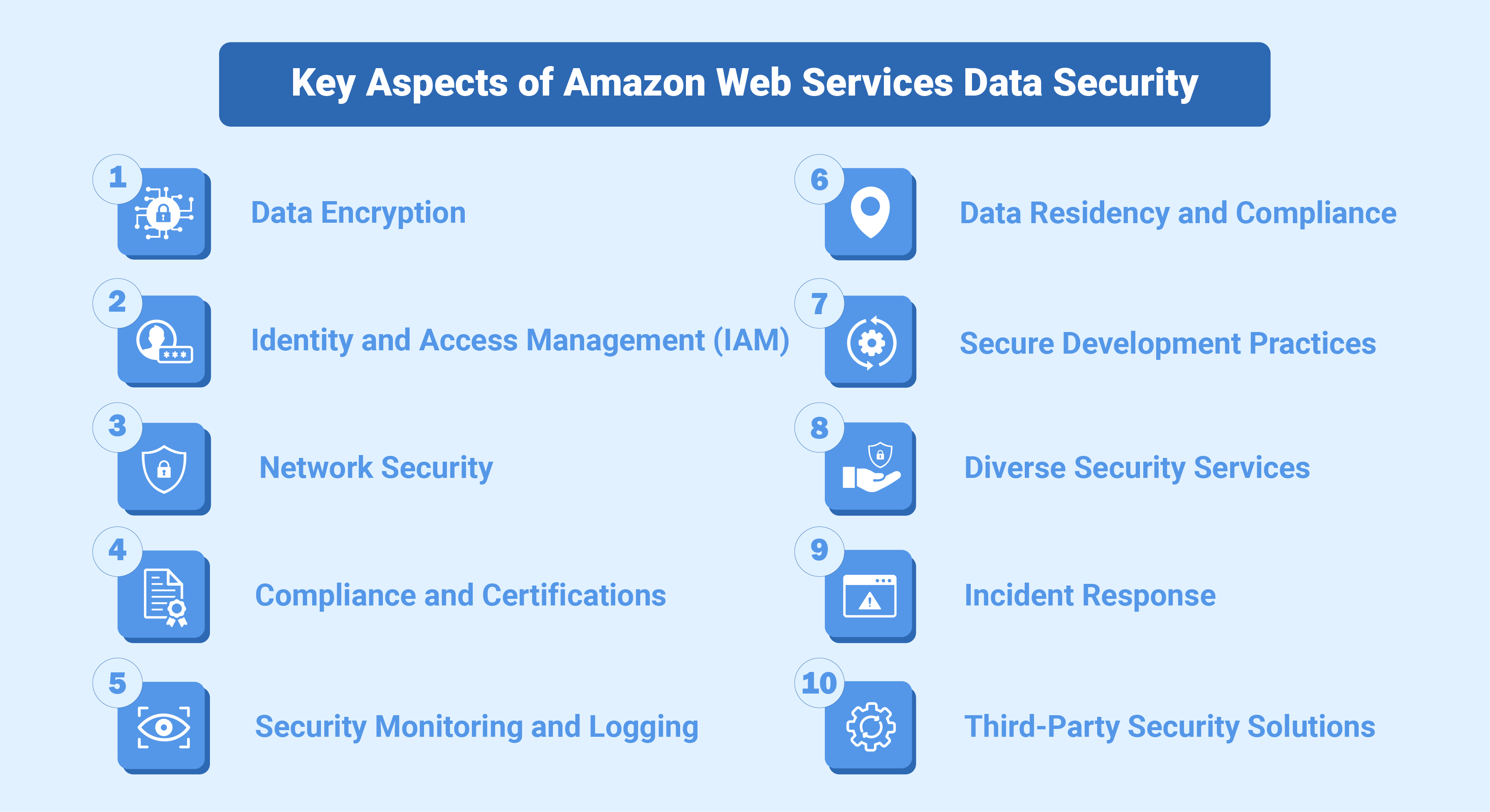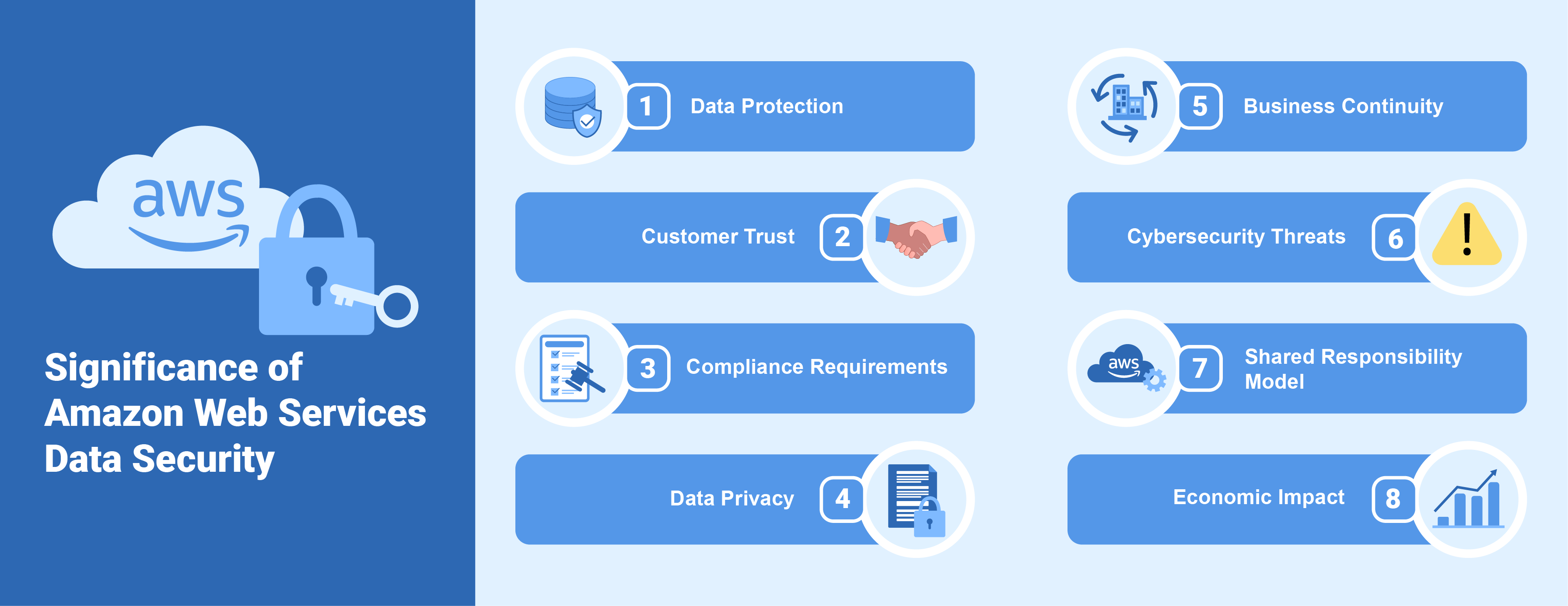
Amazon Web Services Data Security: Key Aspects and Significance
Ready to safeguard your sensitive data on AWS? Amazon web services data security implements encryption and compliance measures to keep your data safe.
In this article, we will explore the key aspects and significance of AWS data security.
Key Takeaways
-
Learn about AWS data security and how it safeguards sensitive information.
-
Understand key aspects such as data encryption, network security, and compliance certifications.
-
Discover the significance of AWS data security, including data protection and business continuity.
-
Explore AWS's shared responsibility model and how it impacts data security measures.
-
Gain insights into how AWS prioritizes security to mitigate risks and ensure stability.
Key Aspects of Amazon Web Services Data Security

1. Data Encryption
AWS supports encryption both at rest and in transit to protect sensitive data. For data at rest, AWS uses AES-256 encryption. The encryption keys can be managed by AWS (SSE-S3) and the customer (SSE-C).
Amazon S3 offers server-side encryption to encrypt data stored in buckets. AWS Key Management Service (KMS) encrypts Amazon EBS volumes for enhanced security.
AWS offers SSL encryption for personal data transmitted over the network. It ensures that data remains secure during transit.
2. Identity and Access Management (IAM)
IAM is a fundamental component of AWS security. It enables customers to control access to their AWS resources. IAM allows organizations to:
-
Create and manage user identities
-
Assign granular permissions
-
Enforce multi-factor authentication (MFA) for an extra layer of security.
Implementing IAM ensures that only authorized users have access to their AWS resources.
3. Network Security
AWS employs powerful network security measures to protect data during transit. This includes distributed denial-of-service (DDoS) protection. It safeguards data against malicious attempts to disrupt network traffic.
AWS offers extra features like Virtual Private Clouds (VPCs). It allows customers to create isolated network environments with custom security configurations, including:
-
Network access control lists (ACLs)
-
Security groups.
4. Compliance and Certifications
AWS adheres to a wide range of industry standards and compliance certifications. It provides customers with the assurance that their data is handled in a secure and compliant manner. These certifications include:
-
SOC 2
-
ISO 27001
-
HIPAA
-
GDPR.
AWS's compliant infrastructure helps organization streamline their compliance efforts. It also helps them meet regulatory requirements.
5. Security Monitoring and Logging
AWS provides several tools for monitoring and logging AWS resources. It enables organizations to detect and respond to security threats in real-time. AWS CloudTrail logs API calls and provides visibility into user activity.
Amazon CloudWatch monitors resource use and triggers alerts for security events. These logs and metrics help organizations gain insights into potential security incidents. It also allows them to take proactive measures to mitigate risks.
6. Data Residency and Compliance
AWS allows customers to choose the location of their data centers. It helps them follow data residency requirements. AWS offers services like AWS Artifact. It provides on-demand access to AWS compliance reports and other documentation.
7. Secure Development Practices
AWS employs secure development practices in building its services. It regularly conducts security reviews and audits. Customers can leverage AWS's secure infrastructure to build and deploy their applications securely.
8. Diverse Security Services
AWS provides a wide range of security services and features, such as:
-
AWS WAF (Web Application Firewall)
-
AWS Shield (DDoS protection)
-
AWS Inspector (security assessment)
-
AWS Secrets Manager (securely store and manage secrets).
9. Incident Response
AWS Cloud Security also develops and implements an incident response plan. It addresses security incidents promptly and effectively. AWS Incident Response (AWS IR) services and best practices can be used for:
-
Incident detection
-
Analysis
-
Response.
Automated incident response workflows can be implemented using:
-
AWS Lambda
-
AWS Step Functions.
10. Third-Party Security Solutions
Third-party security solutions available in the AWS Marketplace help enhance security posture. These include:
-
Security appliances
-
Intrusion detection/prevention systems
-
Vulnerability scanning tools.
Significance of Amazon Web Services Data Security

1. Data Protection
AWS handles vast amounts of sensitive data. These data belong to individuals, businesses, and governments. It ensures the security of this data to prevent:
-
Unauthorized access
-
Data breaches
-
Data loss.
2. Customer Trust
AWS serves millions of customers worldwide. It includes large enterprises, startups, and government agencies. It helps maintain trust for business continuity.
Powerful data security measures instill confidence in customers. It assures them that their data is safe and protected.
3. Compliance Requirements
Many industries and regions have stringent data protection regulations and compliance standards. AWS must adhere to these regulations, such as:
-
GDPR in Europe
-
HIPAA in the healthcare sector in the United States.
Websites failing to follow these regulations can have severe penalties and legal consequences.
4. Data Privacy
AWS customers rely on the platform to store and process their data securely. It ensures data privacy involving:
-
Implementing encryption
-
Access controls
-
Other security measures.
These help prevent unauthorized access or disclosure of sensitive information.
5. Business Continuity
Data breaches or security incidents can disrupt business operations. It leads to:
-
Financial losses
-
Reputational damage
-
Legal liabilities.
Powerful data security measures help cut the risk of such incidents. It also ensures business continuity for AWS and its customers.
6. Cybersecurity Threats
There has been a steady rise in cybersecurity threats, including:
-
Ransomware
-
Sophisticated hacking attempts.
AWS must continuously innovate and enhance its security infrastructure. It will reduce the risk of potential threats.
7. Shared Responsibility Model
AWS operates on a shared responsibility model. It is responsible for "security of the cloud" - protecting infrastructure. AWS handles the security of the cloud infrastructure. Customers are responsible for securing their data and applications within the cloud.
AWS provides a range of security tools and services. It helps customers fulfill their responsibilities.
8. Economic Impact
Data breaches can have significant economic consequences, including:
-
Financial losses for businesses
-
Costs associated with remediation
-
Potential loss of customers due to reputational damage.
AWS prioritizes data security to help businesses mitigate these risks. It also contributes to the economic stability of its customers.
FAQs
1. How does AWS ensure data security across different regions?
AWS employs a framework for data security across all AWS regions. Each region adheres to stringent security protocols and compliance standards, including encryption, access controls, and network security measures.
2. What measures can I take to secure my AWS account and data effectively?
Securing your AWS account helps safeguard sensitive data stored in the cloud. Start by implementing multi-factor authentication (MFA) to add an extra layer of protection to your account. Utilize AWS Identity and Access Management (IAM) to manage user permissions and control access to resources based on the principle of least privilege.
3. How does AWS ensure a secure cloud environment for its customers?
AWS prioritizes the security of its cloud infrastructure. It provides customers with a secure computing environment. AWS adheres to industry best practices and compliance standards. These include ISO 27001, SOC 2, and PCI DSS.
Summary
Amazon Web Services data security implements various measures to safeguard sensitive information. This article also uncovers:
-
Key aspects of AWS data security include data encryption and network security measures.
-
Security monitoring tools like AWS CloudTrail and Amazon CloudWatch enable real-time threat detection.
-
AWS offers diverse security services such as AWS WAF and incident response plans.
-
The significance of AWS data security includes data protection and compliance requirements.
Looking to secure your Magento store? Explore managed Magento hosting solutions backed by powerful AWS services.


